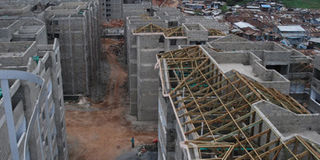Premium
Upgraded slum houses ‘too expensive’

Slum upgrading project at Kibera slums. Many are residents are unable to raise the 10 per cent deposit required to own a home in the Soweto Zone A project. PHOTO/FILE
What you need to know:
- The original residents fear that this is the group that will infiltrate the project meant to benefit the poor.
- Mechanisms are being put in place to ensure that if a beneficiary cannot pay the mortgage, then a relative can assist.
- Only 40 per cent of the 632 households are currently paying the 10 per cent deposit of the yet-to-be-decided total cost of the units, said Mr Hongo.
As it nears completion, thousands of Kibera slum dwellers will not own houses in the Soweto Zone A slum upgrading project.
The bulk of residents are unable to raise the 10 per cent deposit required to own a home in the project.
As a result, the residents who were temporarily moved to the decanting site in Lang’ata last year have expressed fears that the project could be hijacked.
“I just started to pay through the cooperative recently. I first waited to see how serious the project was although I do not know whether many people will raise the required amount,” said a resident, Ms Everlyne Gaigai.
Further, people from other estates have rented houses at the decanting site. A three-room house with water at the site goes for Sh2,100 a month and some residents are too poor to pay, forcing them to sublet instead.
The original residents fear that this is the group that will infiltrate the project meant to benefit the poor. The chairman for the decanting site, who is also a member of the settlement executive committee, Mr Walter Hongo, dispelled the fears, saying that no beneficiary would be short-changed.
SPECIAL IDENTITY
Mr Hongo has kept a list of the 632 households that were moved to pave the way for the construction of the new houses at the beginning of 2012. All the beneficiaries have a special identity card which clearly distinguishes them from masqueraders.
“We agreed that all beneficiaries save up to 10 per cent of the total cost of a unit. People started saving four years ago and a good number have paid almost the whole amount. We encourage others to do so because they know that the houses are not for free,” said Mr Hongo.
Initially the cost of a housing unit was set at Sh900,000 on the lower side, meaning that beneficiaries were supposed to pay Sh90,000 as deposit.
If the unit cost is Sh2 million, beneficiaries are supposed to pay Sh200,000 as deposit, explained Mr Hongo.
The initial cost of the 912 housing units was Sh2.9 billion, said the site engineer, Mr Zakayo K. Nguitu. This is expected to go up as a result of inflation.
It is expected that within the next three months the beneficiaries will know the exact amount they are supposed to pay. The construction of the units started in March last year and is expected to be completed next year, said Mr Nguitu.
MORGAGE SCHEME
“Over 57 per cent of the project is complete. We will soon be starting the external works, which include landscaping and construction of drainage systems,” he said.
The houses will not be rented. Instead beneficiaries are expected to pay the deposit and subsequently the remaining amount in a mortgage scheme to own the houses.
Ms Wilter Nyaboke expressed her disappointment: “The houses were not made for the poor people but for the rich, the real slum dwellers cannot afford the 10 per cent.”
Only 40 per cent of the 632 households are currently paying the 10 per cent deposit of the yet-to-be-decided total cost of the units, said Mr Hongo.
Assuming that all the 632 households pay the amount, the remainder of the 912 housing units will benefit residents who were not transferred last year and those living along the rail and power lines, said Mr Nguitu.
Mechanisms are being put in place to ensure that if a beneficiary cannot pay the mortgage, then a relative can assist. The beneficiaries will also be allowed to let part of the house to raise money to clear the mortgage, explained Mr Hongo.
The slum upgrading programme was started in earnest in 2003 as part of the government’s efforts to improve the living standards of people living in slums.
The Kibera 912-units comprising 24 blocks of six-storey buildings of which 22 blocks are almost complete is the first phase of the programme targeting to overhaul slums in Nairobi and other towns.
“We resisted at first but we later realised that it was meant for our own good. I am almost completing my 10 per cent,” Mr Hongo said.




